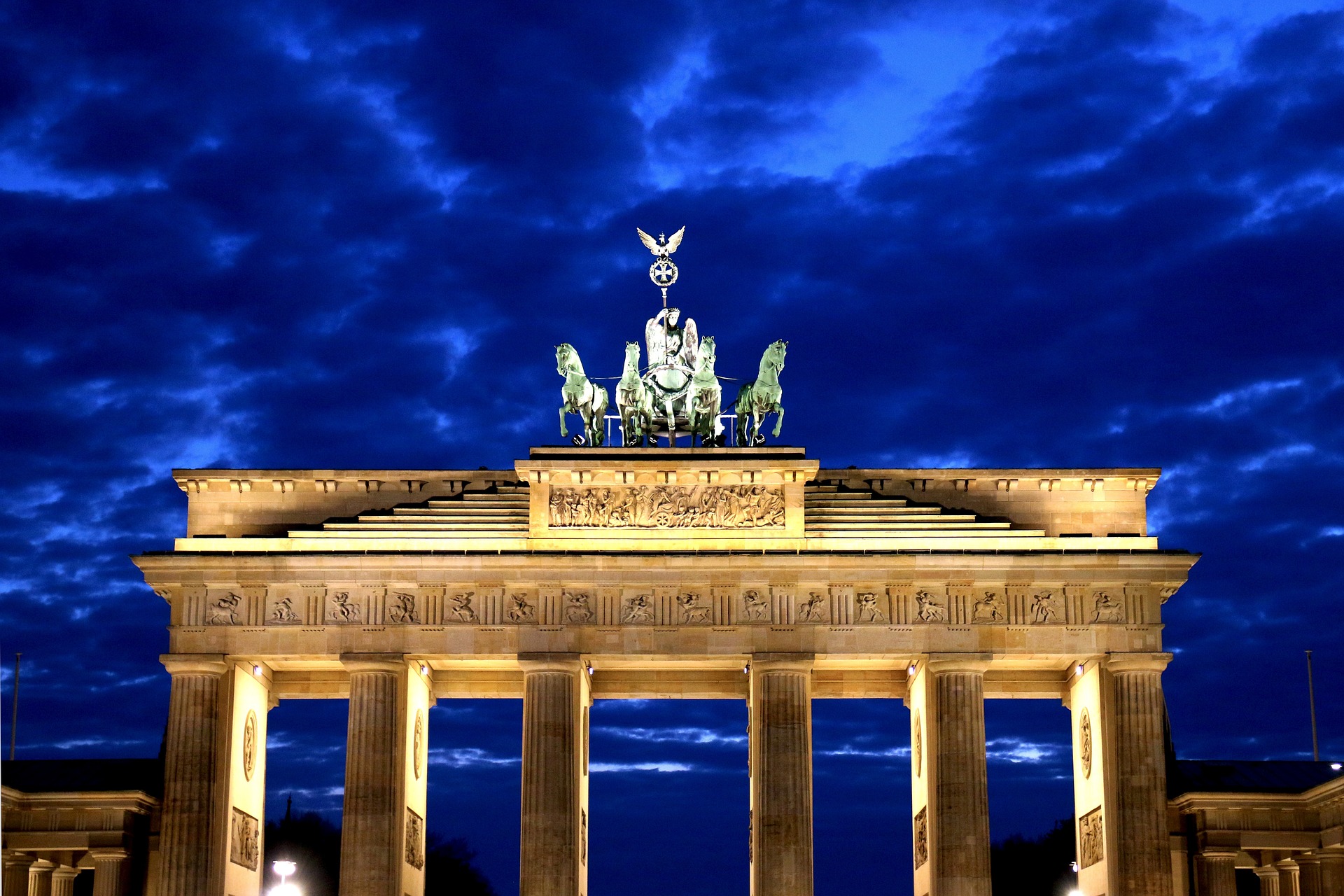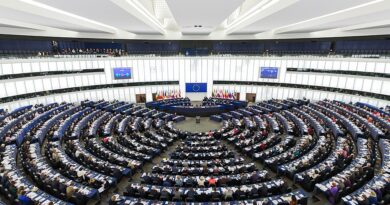European Drang nach Osten: EU annihilation on the horizon

The Union is to turn into a German European State, posing a mortal threat to Poland. We have just received another signal that this plan will be pushed through. We don’t want to see it, and there is less and less time for us to wake up
Rafał A. Ziemkiewicz
The joint declaration issued in recent days by the German and French governments has once again confirmed that no matter what, there is no question of abandoning the dogma of “steady deepening of European integration.” Not only in these two countries, but in Europe’s ruling elites in general, there is no diminishing determination to replace the current Union – an agreement of sovereign states that have pledged to pursue common policies in specific areas and have established common institutions endowed with treaty-defined powers for this purpose – with a centralized European state.
Advocates of this operation, who present it (as, by the way, do almost all foolish ideas in the history of the West) as a “historical necessity” and with this argument invalidate all arguments against “necessity,” here readily use the term “United States of Europe.” However, this is purely a PR stunt; in fact, the structure laboriously erected by Scholz, Macron, der Leyen, and others is based on completely different assumptions than those once put in place by the American colonists – for it is to be a socialist state, with enormous powers, performing large-scale redistribution among the provinces and regulating virtually all areas of life down to the most minute details. While it is accepted to call the efforts of the “old union” a plan for the “federalization of Europe,” it would be more appropriate to speak of a drive to centralize it.
Against the citizens
However, what stands in the way of “necessity” are the EU treaties signed at one time, and in turn, in the way of making changes to them to legitimize a unified Euro-state – the fact that the vast majority of citizens of European countries do not want these changes. Attempts to gain democratic legitimacy for the “European Constitution” ended in failure. The defeat in the referendums in Ireland, France, and the Netherlands, however, has not prompted anyone to abandon the “tightening of integration,” or even to say that the road to it should be led not by top-down intrigues, but by working to convince European societies of the ideas emerging in the circles of power.
It is noteworthy how circles, for show, flaunting progressive rhetoric and platitudes about equality, in the implementation of “historical necessity” display a truly 19th-century paternalism, no different from the ideas propounded at the infamous Berlin Conference of 1884, justifying the colonization of Africa and other continents. A group of enlightened senior officials from the “old union” countries, standing above the perceptive capacities of the human race, consider themselves called upon to impose on European countries by one means or another, by cunning, deceit, propaganda, blackmail or violence, a vision of development that they have concocted and which is the only right one; once it is imposed, the subjects will convince themselves that it was the right thing to do. It is hard to resist an association here with the way the elites of the Third Republic, born in Magdalenka2, carried out the “systemic transformation” in the early Balcerowicz era.
Two engines powering the process
The process of fulfilling the “historical necessity” of steadily deepening European integration and gradually transforming Europe into a centralized state is driven by two engines.
The first is the caste instinct of the Eurocracy bred in recent decades, a truly Byzantine group of tens if not already hundreds of thousands of officials, MEPs, activists of various EU high councils, commissions and delegations from this and that, with pyramids of assistants, secretaries, and associates. Their incomes (extremely high, if we compare the appanages of “EUers” with those of members of the US state administration, not to mention poorer countries) depend entirely on the sprawl of the European headquarters. Even if vested interests were not at work here, the age-old principles of bureaucratic functioning, best known through satirical description in the form of “Parkinson’s Laws,” make each of the EU institutions constantly stretch beyond their treaty-given powers: the European Commission is trying to transform itself from an executive secretariat, coordinating common policies, into an EU government above national governments, the CJEU is trying to transform itself from an arbitration commission into a European supreme court, and the European Parliament wants to be a truly European legislative body, not a facade institution, serving to siphon off elites from individual countries and corrupt them with wealth unimaginable at the national level.

The second, more powerful motor is the imperialism of the “old Union” countries, especially Germany. The conviction that one is inherently superior and wiser, merely predestined to dominate the continent and bring civilizational order to it (for which the various resulting privileges are only obvious, deserved compensation) under the glaze of fashionable rhetoric has not changed in the slightest. France sees in the construction of the European State a means of salvaging its superpower status, to which it seems all the more attached the less real reason for it. Germany, on the other hand, is gradually transforming the EU apparatus into a kind of exoskeleton that reinforces the pursuit of its national interest – which it still sees in the same way as Otto von Bismarck saw it 150 years ago, as a mission to dominate the West on the basis of a mutually beneficial alliance with the East.
The Russian onslaught on Ukraine caused a change in US policy, which was willing to approve the domination over the Old Continent of the German-Russian alliance on the condition that the Kremlin move to the anti-China camp, or at least remain neutral in America’s dispute with its main rival. However, since Russia has demonstratively announced an alliance with China aimed at the West, i.e. precisely at the global domination of the US, and the postulated European State is designed to be closely tied to Russia, the German-French (or rather, simply German, since France’s position in the EU’s ruling duumvirate is increasingly weakening) plans are no longer acceptable to Washington.
Berlin with Paris
Hence, to return to the event, last week’s “joint meeting of the governments of Germany and France” and the following conference of Macron and Scholz, at which, amidst the torrent of Euro-babble to which we are already accustomed (Germany and France will “strengthen cooperation in transforming Europe’s energy industry into a zero-carbon and planet-friendly one,” etc.), an important political signal was conveyed, addressed equally to America and to the countries of our region. A signal, unfortunately, poorly noted by our media, as a rule omitting all “news” that can’t be used to emotionally hit Law and Justice or the Civic Platform.
Macron and Scholz announced, first, that the recent misunderstandings between their countries had been cleared up and that the alliance between Berlin and Paris still constitutes and will continue to constitute the “EU locomotive,” which will continue in its current direction: towards deeper integration and the building of a single European state. The main message of the “joint meeting” was to reaffirm the determination to move away from the formula of unanimous decision-making in the European Council. The two major EU capitals will demand that decisions, at least those on Europe’s finances and foreign policy (?), be taken by qualified majority – in practice, by Berlin and Paris leading the “old Europe.” At the joint conference, Scholz and Macron made no secret of the fact that the reason why abandoning unanimity is necessary is because of the “irresponsible” actions of Warsaw and Budapest, which, in the name of their national vested interests, veto or announce vetoing decisions that are key to strengthening European centrality, such as the imposition of new “European” taxes.
The idea of abandoning unanimity is thus promoted consistently and persistently. Let’s recall that it emerged as a “recommendation” of the so-called “conference on the future of Europe.” This was a strange body, chosen in an obscure way from representatives of arbitrarily designated “pro-European” organizations and circles, which was supposed to create a propaganda semblance of democratic acceptance for the construction of the European State. Then the “necessity” of getting rid of the “selfish blocking of joint decisions in the name of narrow national interests” was announced in interviews and newspaper articles by Olaf Scholz – in the same breath as the announcement that “Germany will take over responsibility for Europe to a greater extent than before.” Obtaining the clear and explicit acceptance of Paris for this “assumption of responsibility” is the next step in Berlin’s consistent implementation of its plan. Since the reason for the dispute, the demonstration of which culminated in a joint meeting between the two governments, was French opposition to Germany’s plans to pump 200 billion euros in domestic funds into its economy to give it a competitive edge over the rest of Europe, one can guess that France’s support for the elimination of unanimity was bought with some concession from Germany on this very issue. There is no sign that Germany is deviating from said announcement, so the compromise is probably about extending the “financial afterburner” measure to French companies in some part.
In short, we have received another signal that the implementation of a plan that for many reasons poses a mortal threat to Poland is underway and will continue until it is met with strong counteraction. The German European State is to mean not only the gradual deprivation of Poland’s independence, but also the return, sooner or later, to Western Europe’s partnership with Russia and the death of hope of building on the basis of Ukraine’s independence, defended with Western help, the strength of central Europe.
Displaced evidence
Unfortunately, this further evidence that the threat to Poland is growing and that the European Union is irreversibly losing the character of an economic community beneficial to Poland, turning into a neo-imperialist construct hostile to us (there could hardly be a more demonstrative rejection of the EU’s treaty foundations than the aforementioned German announcement of a gargantuan subsidy to its economy, and this in a situation where Germany is already the beneficiary of about half of all legal state aid in the EU), is, like the previous evidence, being pushed out of Polish consciousness. Through the joint propaganda efforts of the fatally quarreling Law and Justice party and the Civic Platform, which are perfectly aligned on this issue, the conviction is being perpetuated in Poles that the EU is the only possible source of prosperity and modernization and even security for Poland, and that the loss of funds flowing from it (pennies after all, compared to the sacrifices required to build the European State) would be a national catastrophe.
Bringing the political dispute down to a hysterical reassurance of Poles as to who will “get” them the mythical money from the EU, unfortunately, results in a widespread stupefaction of the public, which can only be compared to the success of martial law propaganda in telling them that Gen. Jaruzelski saved Poland from Soviet occupation. This is evidenced by a recent Eurostat survey, carried out in all EU countries, in which it turns out that Poles most associate their hopes for a better future with money from the common European debt (the so-called NGEU Plan), in our country operating under the acronym “National Recovery Plan.”
While the adoption of the perspective of the “European State” and the abandonment of loyalty to Poland in favor of loyalty to the enigmatically imagined “Europe” (not always with the knowledge that it is only a code name for “Greater “Germany”) is understandable in the case of the left-liberal camp, which has always based its identity and sense of superiority on a post-colonial comprador instinct, while the helplessness of the Law and Justice Party’s narrative, overpowering its otherwise declaring patriotic stance to an iron-fisted electorate, is difficult to understand.
Is it due to ignorance – the entire context of the European transition described here seems intellectually incomprehensible to most Law and Justice politicians – either due to a short-sighted focus on ad hoc pomp, or to self-interest and the hope of getting fat cushions in the Brussels “Biz-antium” as a reward for submissiveness? Whatever the reasons, we have less and less time to overcome them and wake up from the dream of EU money before it leads us to the another national catastrophe.
1 Regarding the title – literally meaning “shift Eastward”
2 the Magdalenka talks held in 1988 were a series of political discussions about the systemic transformation and transfer of power from the Polish People’s Republic to the Republic of Poland, i.e. from the communist regime into a democratically elected government.



